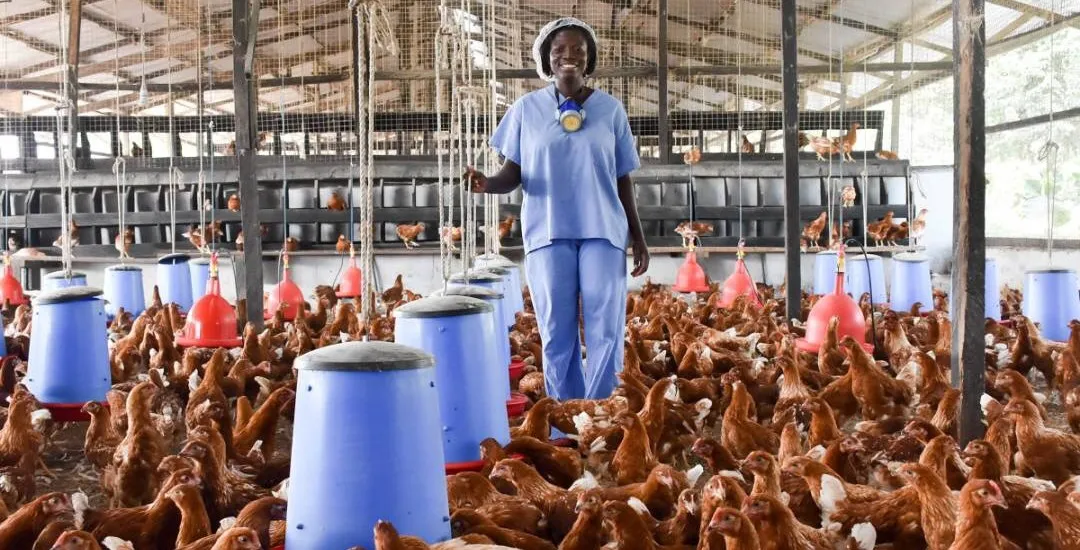For 10 years, the Greater Accra Poultry Farmers Association (GAPFA) sought ways to expand its operations and produce enough chicken and turkey feed to meet the growing demands of its 1,500 members and other poultry farmers across the country. GAFPFA needed about $3.5 million in financing to increase its feed mill capacity from 10 to 15 metric tons per hour, construct a silo and office complex, and procure raw materials mainly maize and soybean primarily sourced from northern Ghana to process different feed mashes.
“As a non-profit organization with members who are predominantly small and medium-scale poultry farmers, GAPFA was reluctant to take a bank loan due to high-interest rates and unfavourable lending conditions,” Michael Nyarko-Ampem, immediate past President of GAPFA said. “We were looking for alternative and affordable sources of financing that meet our needs but didn’t know how to access that.”
In April 2021, GAPFA met Tradeline Consult, a transaction advisor supported by the Feed the Future Ghana Mobilizing Finance in Agriculture (MFA) Activity. MFA is a USAID-supported Activity that is working to make financing easier to obtain and more available for farmers and agribusinesses in Ghana. Through a network of transaction advisors including Tradeline and partner financial institutions, MFA helps the agribusiness community to secure financing to improve commercial agriculture, contribute to food security, and create sustainable livelihoods.
Tradeline worked with the executives of GAPFA to explore affordable sources of financing including the Outgrower and Value Chain Fund implemented by the Government of Ghana with support from the Federal Republic of Germany through the KfW Development Bank.
Tradeline supported GAPFA to develop a business and financing plan, prepared the agribusiness to qualify for investment, submit loan applications to multiple investors and provided guidance on loan repayment. GAPFA was successful with its application for a $4.61 million grant from Investing for Employment (IFE) funded by the German Federal Ministry for Economic Cooperation and Development (BMZ) for its expansion project. IFE provided GAPFA with $3.024 million (65.58%) of the grant while GAPFA provided a matching grant of $1.587 million (34.42%).
Through the support of Tradeline, GAPFA secured $683,013 financing from the GCB Bank to add to its contribution to the matching grant in order to access the full grant from IFE. Access to the IFE financing paved the way for Tradeline to secure $80,000 in working capital from Absa Bank Ghana at an interest of 26% payable within 12 months for GAPFA to procure maize and soybeans aggregated from smallholder farmers in northern Ghana for processing.
The 15-metric tons per hour capacity feed mill will require 51,650 metric tons of maize and 27,650 metric tons of soy to produce 54,000 (85%)/62,100 (100%) metric tons of feed per annum. This will provide a ready market for six major aggregators of maize and soy from an estimated 12,657 smallholder farmers (60% of whom are female) engaged in the production of the two crops in northern Ghana. It will also increase the number of people directly employed by GAPFA from125 to 530.
“Support from Tradeline has helped us to access the appropriate financing for our expansion project. We can now produce more feed at a lower cost for our members and other poultry farmers to make a profit and grow their businesses,” said Nyarko-Ampem.
For Moses Mallaghan, Chief Executive Officer of Agri Innova Limited, one of the six aggregators engaged to supply maize and soybeans to GAPFA, “Expanded production and supply of maize and soybean to GAPFA will provide a ready market for smallholder farmers in northern Ghana and shield them from post-harvest losses.” Moses added, “It will encourage them to increase production and attract more farmers to go into the production of maize and soybean for income to improve living conditions and assure GAPFA of a consistent supply of raw materials.”
Already, GAPFA has constructed a 4,000 metric ton capacity warehouse to store raw materials and finished products. This is in line with its business model to utilize economies of scale and eliminate wastage to reduce the cost of producing poultry feed thereby, making the per-kilo price competitive.
Sam Zeph Atiemo, Managing Partner of Tradeline Consult said, “Our engagement with GAPFA has been a big learning on how to improve on our financial modelling. We had to guide the executives on how to access affordable finance through an open process and remodel their project to match their financing requirements.” “Our transaction advisory support has gone beyond facilitating finance to include project management,” added Atiemo.

